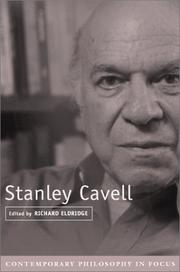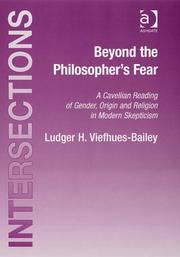| Listing 1 - 6 of 6 |
Sort by
|

ISBN: 1107128595 128041779X 1139146238 0511170076 0511066619 0511060300 0511297173 0511613946 0511068743 9780511066610 0521770254 9780521770255 0521779723 9780521779722 9780511068744 9780511613944 Year: 2003 Publisher: Cambridge Cambridge University Press
Abstract | Keywords | Export | Availability | Bookmark
 Loading...
Loading...Choose an application
- Reference Manager
- EndNote
- RefWorks (Direct export to RefWorks)
Contemporary Philosophy in Focus offers a series of introductory volumes on many of the dominant philosophical thinkers of the current age. Stanley Cavell has been one of the most creative and independent of contemporary philosophical voices. At the core of his thought is the view that skepticism is not a theoretical position to be refuted by philosophical theory but is a reflection of the fundamental limits of human knowledge of the self, of others and of the external world that must be accepted. This volume is the first attempt systematically and accessibly to describe and assess the full range of Cavell's work. There are new accounts of Cavell's contribution to the philosophy of mind and language, the theory of action, ethics, aesthetics, Romanticism, American philosophy, Shakespeare, and film and opera. Outside philosophy the appeal of this volume will be unusually broad.
Cavell, Stanley, --- Cavell, Stanley Louis, --- Goldstein, Stanley Louis, --- カヴェル, スタンリー, --- Arts and Humanities --- Philosophy
Book
ISBN: 100909971X 1316515257 1009103237 Year: 2022 Publisher: Cambridge : Cambridge University Press,
Abstract | Keywords | Export | Availability | Bookmark
 Loading...
Loading...Choose an application
- Reference Manager
- EndNote
- RefWorks (Direct export to RefWorks)
In 1969 Stanley Cavell's Must We Mean What We Say? revolutionized philosophy of ordinary language, aesthetics, ethics, tragedy, literature, music, art criticism, and modernism. This volume of new essays offers a multi-faceted exploration of Cavell's first and most important book, fifty years after its publication. The key subjects which animate Cavell's book are explored in detail: ordinary language, aesthetics, modernism, skepticism, forms of life, philosophy and literature, tragedy and the self, the questions of voice and audience, jazz and sound, Wittgenstein, Austin, Beckett, Kierkegaard, Shakespeare. The essays make Cavell's complex style and sometimes difficult thought accessible to a new generation of students and scholars. They offer a way into Cavell's unique philosophical voice, conveying its seminal importance as an intellectual intervention in American thought and culture, and showing how its philosophical radicality remains of lasting significance for contemporary philosophy, American philosophy, literary studies, and cultural studies.
Philosophy, Modern. --- Cavell, Stanley, --- Modern philosophy --- Cavell, Stanley Louis, --- Goldstein, Stanley Louis, --- カヴェル, スタンリー,
Book
ISBN: 1804130192 1804130184 Year: 2023 Publisher: Exeter, England : University of Exeter Press,
Abstract | Keywords | Export | Availability | Bookmark
 Loading...
Loading...Choose an application
- Reference Manager
- EndNote
- RefWorks (Direct export to RefWorks)
This collection of new work on the philosophical importance of television starts from a model for reading films proposed by Stanley Cavell, whereby film in its entirety-actors and production included-brings its own intelligence to its realization. In turn, this intelligence educates us as viewers, leading us to recognize and appreciate our individual cinephilic tastes, and to know ourselves and each other better. This reading is even more valid for TV series. Yet, in spite of the progress of film-philosophy, there has been a paucity of concurrent analysis of the ethical stakes, the modes of expressiveness, and the moral education involved in television series. Perhaps most conspicuously, there has been a lack of focus on the experience of the viewer. Cavell highlighted popular cinema's capacity to create a common culture for millions. This power has become dispersed across other bodies of work and practices, most notably TV series, which have largely appropriated the responsibility of widening the perspectives of their publics, a role once associated with the silver screen. Just as Cavell's reading of films involved moral perfectionism in its intent, this project is also perfectionist, extending a similar aesthetic and ethical method to readings of the small screen. Because TV series are works that are public and thus shared, and often global in reach, they fulfil an educational role-whether intended or not-and one that enables viewers to anchor and appreciate the value of their everyday experiences. Contributions from: William Rothman, Martin Shuster, Elisabeth Bronfen, Hugo Clémot, David LaRocca, Jeroen Gerrits, Stephen Mulhall, Michelle Devereaux, Thibaut de Saint-Maurice, Hent de Vries, Catherine Wheatley, Byron Davies, Sandra Laugier, Paul Standish, Robert Sinnerbrink.
Television --- Moral and ethical aspects. --- Philosophy. --- Cavell, Stanley, --- Radio vision --- TV --- Artificial satellites in telecommunication --- Electronic systems --- Optoelectronic devices --- Telecommunication --- Astronautics --- Optical communication systems --- Cavell, Stanley Louis, --- Goldstein, Stanley Louis, --- カヴェル, スタンリー,

ISBN: 1315261588 1281099260 9786611099268 0754687007 9780754687009 0754655229 9780754655220 9781315261584 9781281099266 6611099263 9781351955478 1351955489 Year: 2016 Publisher: London : Routledge,
Abstract | Keywords | Export | Availability | Bookmark
 Loading...
Loading...Choose an application
- Reference Manager
- EndNote
- RefWorks (Direct export to RefWorks)
Based on a detailed analysis of gender in Stanley Cavell's treatment of the skeptical problem, this book addresses the relationship between gender and religion in modern skepticism. Engaging in dialogue with Julia Kristeva's philosophy, Viefhues claims that a religious problem underlies Cavell's understanding of the feminine.
Skepticism. --- Sex role. --- Religion. --- Religion, Primitive --- Atheism --- Irreligion --- Religions --- Theology --- Gender role --- Sex (Psychology) --- Sex differences (Psychology) --- Social role --- Gender expression --- Sexism --- Scepticism --- Unbelief --- Agnosticism --- Belief and doubt --- Free thought --- Cavell, Stanley, --- Cavell, Stanley Louis, --- Goldstein, Stanley Louis, --- カヴェル, スタンリー, --- Religion --- Sex role --- Skepticism --- Gender roles --- Gendered role --- Gendered roles --- Role, Gender --- Role, Gendered --- Role, Sex --- Roles, Gender --- Roles, Gendered --- Roles, Sex --- Sex roles
Multi
ISBN: 178499779X 1784997358 1784994014 1784994022 Year: 2016 Publisher: Manchester, UK : Manchester University Press,
Abstract | Keywords | Export | Availability | Bookmark
 Loading...
Loading...Choose an application
- Reference Manager
- EndNote
- RefWorks (Direct export to RefWorks)
In the lead essay for this volume, Joshua Foa Dienstag engages in a critical encounter with the work of Stanley Cavell on cinema, focusing sceptical attention on the claims made for the contribution of cinema to the ethical character of democratic life. In this debate, Dienstag mirrors the celebrated dialogue between Rousseau and Jean D'Alembert on theatre, casting Cavell as D'Alembert in his view that we can learn to become better citizens and better people by observing a staged representation of human life, with Dienstag arguing, after Rousseau, that this misunderstands the relationship between original and copy, even more so in the medium of film than in the medium of theatre. The argument is developed further by essays from Clare Woodford, Tracy B. Strong, Margaret Kohn, Davide Panagia and Thomas Dunn, to which Dienstag responds in the concluding chapter, 'A reply to my critics'.
Motion pictures --- Political aspects. --- Philosophy. --- Plots, themes, etc. --- Cavell, Stanley, --- Motion picture plays --- Motion picture plots --- Plots (Drama, novel, etc.) --- Film genres --- Cinema --- Feature films --- Films --- Movies --- Moving-pictures --- Audio-visual materials --- Mass media --- Performing arts --- Themes, motives --- History and criticism --- Cavell, Stanley Louis, --- Goldstein, Stanley Louis, --- カヴェル, スタンリー, --- cinema --- stanley cavell --- ethics --- democracy --- political theory --- Humanities. --- Ethics and moral philosophy. --- POLITICAL SCIENCE / History & Theory. --- Philosophy & Religion --- Philosophy --- Topics in philosophy --- Ethics & moral philosophy.
Book
ISBN: 1137508965 1349576816 1137508973 Year: 2016 Publisher: London : Palgrave Macmillan UK : Imprint: Palgrave Macmillan,
Abstract | Keywords | Export | Availability | Bookmark
 Loading...
Loading...Choose an application
- Reference Manager
- EndNote
- RefWorks (Direct export to RefWorks)
Drawing on Hannah Arendt, Judith Butler and Stanley Cavell, this book addresses contemporary theoretical and political debates in a broader comparative perspective and rearticulates the relationship between ethics and politics by highlighting those who are currently excluded from our notions of political community.
Self (Philosophy) --- Agent (Philosophy) --- Ethics --- Speculative Philosophy --- Philosophy --- Philosophy & Religion --- Ethics. --- Arendt, Hannah, --- Butler, Judith, --- Cavell, Stanley, --- Deontology --- Ethics, Primitive --- Ethology --- Moral philosophy --- Morality --- Morals --- Philosophy, Moral --- Science, Moral --- Agency (Philosophy) --- Agents --- Person (Philosophy) --- スタンリー・カヴェル, --- Goldstein, Stanley Louis, --- カヴェル, スタンリー, --- Values --- Act (Philosophy) --- Political theory. --- Political science --- Social sciences-Philosophy. --- World politics. --- Political Theory. --- Political Philosophy. --- Social Philosophy. --- Sociology, general. --- Political History. --- Colonialism --- Global politics --- International politics --- Political history --- World history --- Eastern question --- Geopolitics --- International organization --- International relations --- Political philosophy --- Administration --- Civil government --- Commonwealth, The --- Government --- Political theory --- Political thought --- Politics --- Science, Political --- Social sciences --- State, The --- Philosophy. --- Political philosophy. --- Social sciences—Philosophy. --- Sociology. --- Social theory --- Blücher, Hannah Arendt, --- Bluecher, Hannah Arendt, --- Ārento, Hanna, --- Arendt, H. --- Arendt, Khanna, --- ארנדט, חנה --- アーレント, ハンナ, --- Cavell, Stanley Louis,
| Listing 1 - 6 of 6 |
Sort by
|

 Search
Search Feedback
Feedback About UniCat
About UniCat  Help
Help News
News